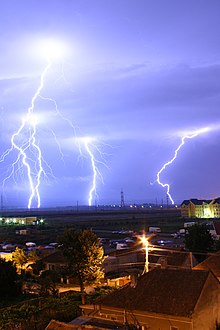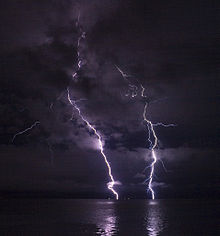Thunder
Appearance
(Redirected from Thundering)

Thunder is the sound caused by lightning. Depending upon the distance from and nature of the lightning, it can range from a long, low rumble to a sudden, loud crack. The sudden increase in temperature and hence pressure caused by the lightning produces rapid expansion of the air in the path of a lightning bolt. In turn, this expansion of air creates a sonic shock wave, often referred to as a "thunderclap" or "peal of thunder". The distance of the lightning can be calculated by the listener based on the time interval from when the lightning is seen to when the sound is heard.
Quotes
[edit]

The branches reft asunder;
But you and I we do not shrink;
We love the lovely thunder. ~ Ogden Nash
- Twere better far
That gods should quaff their nectar merrily,
And men sing out the day like grasshoppers,
So may they haply lull the watchful thunder.- Hartley Coleridge, Prometheus.
- See how the rascals use me! They will not let my play run; and yet they steal my thunder.
- John Dennis; alternately reported as: "That is my thunder, by God; the villains will play my thunder, but not my play." Reported in Bartlett's Familiar Quotations, 10th ed. (1919).
- Note: Dennis had written a tragedy, Appius and Virginia, for which he had invented a new technique for creating the sound of thunder, which the actors favored and which remained in use for centuries thereafter. The play itself was poorly received despite this innovation, and the management of the Drury Lane Theatre withdrew it. A few nights later, Dennis was in the pit at a performance of Macbeth, and heard his own thunder used; upon which he rose in a violent passion, and exclaimed with an oath, that it was his thunder. In Biographia Britannica, Volume v, p. 103. Conflicting reports exist as to whether Dennis actually used the phrase "steal my thunder", although it is undisputed that his experience is the origin of the idiom.
- The thunderstorm is a constant phenomenon, raging alternately over some part of the world or the other. Can a single man or creature escape death if all that charge of lightning strikes the earth?
- Kalki Krishnamurthy, in "Sivakozhundu of Tiruvazhundur" as translated in Kalki : Selected Stories (1999).
- The sky is now indelible ink,
The branches reft asunder;
But you and I we do not shrink;
We love the lovely thunder.- Ogden Nash, A Watched Example Never Boils.
- Thunder is good, thunder is impressive; but it is lightning that does the work.
- Mark Twain, letter to an Unidentified Person (1908).
Hoyt's New Cyclopedia Of Practical Quotations
[edit]- Quotes reported in Hoyt's New Cyclopedia Of Practical Quotations (1922), p. 791.
- The sky is changed! — and such a change! O night,
And storm, and darkness, ye are wondrous strong,
Yet lovely in your strength, as is the light
Of a dark eye in woman! Far along,
From peak to peak the rattling crags among
Leaps the live thunder!- Lord Byron, Childe Harold's Pilgrimage, Canto III (1816), Stanza 92.
- Hark, hark! Deep sounds, and deeper still,
Are howling from the mountain's bosom:
There's not a breath of wind upon the hill,
Yet quivers every leaf, and drops each blossom:
Earth groans as if beneath a heavy load.- Lord Byron, Heaven and Earth, Part I, scene 3.
- Loud roared the dreadful thunder,
The rain a deluge showers.- Andrew Cherry, Bay of Biscay.
- Thy thunder, conscious of the new command,
Rumbles reluctant o'er our fallen house.- John Keats, Hyperion (1818-19), line 60.
- As a storm-cloud lurid with lightning
And a cry of lamentation,
Repeated and again repeated,
Deep and loud
As the reverberation
Of cloud answering unto cloud,
Swells and rose away in the distance,
As if the sheeted
Lightning retreated,
Baffled and thwarted by the wind's resistance.- Henry Wadsworth Longfellow, Christus, The Golden Legend (1872), Epilogue, line 62.
- The thunder,
Wing'd with red lightning and impetuous rage,
Perhaps hath spent his shafts, and ceases now
To bellow through the vast and boundless deep.- John Milton, Paradise Lost (1667; 1674), Book I, line 174.
- To stand against the deep, dread-bolted thunder?
In the most terrible and nimble stroke
Of quick, cross lightning?- William Shakespeare, King Lear (1608), Act IV, scene 7, line 33.
- Are there no stones in heaven
But what serve for the thunder?- William Shakespeare, Othello (c. 1603), Act V, scene 2, line 234.
- * * The thunder,
That deep and dreadful organ-pipe, pronounc'd
The name of Prosper; it did bass my trespass.- William Shakespeare, The Tempest (c. 1610-1612), Act III, scene 3, line 97.
- C'est l'éclair qui paraît, la foudre va partir.
- It is the flash which appears, the thunderbolt will follow.
- Voltaire, Oreste, II. 7.


